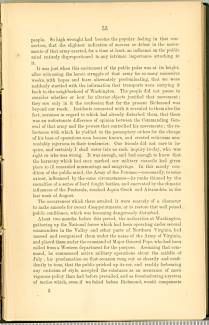Collection Name
About
people. So high wrought had become the popular feeling in that connection, that the slightest indication of success or defeat in the movements of that army exerted, for a time at least, an influence on the public mind entirely disproportioned to any intrinsic importance attaching to it.
It was just when this excitement of the public pulse was at its height, after witnessing the heroic struggle of that army for so many successive weeks, with hopes and fears alternately predominating, that we were suddenly startled with the information that transports were carrying it back to the neighborhood of Washington. The people did not pause to consider whether or how far ulterior objects justified that movement; they saw only in it the confession that for the present Richmond was beyond our reach. Incidents connected with it revealed to them also the fact, surmises in regard to which had already disturbed them, that there was an unfortunate difference of opinion between the Commanding General of that army and the powers that controlled his movements ; the reluctance with which he yielded to the peremptory orders for the change of his base of operations soon became known, and created criticisms unavoidably injurious in their tendencies. Our friends did not care to inquire, and certainly I shall enter into no such inquiry to-day, who was right or who was wrong. It was enough, and bad enough to know that the harmony which had once marked our military councils had given place to ill concealed murmurings and misgivings. In this moody condition of the public mind, the Army of the Potomac—necessarily, to some extent, influenced by the same circumstances—its ranks thinned by the casualties of a series of hard fought battles, and enervated by the climatic influences of the Peninsula, reached Aquia Creek and Alexandria in the last week of August.
The occurrences which there awaited it were scarcely of a character to make amends for recent disappointments, or to restore that well poised public confidence, which was becoming dangerously disturbed.
About two months before this period, the authorities at Washington, gathering up the National forces which had been operating under several commanders in the Valley and other parts of Northern Virginia, had massed and reorganized them under the name of the Army of Virginia, and placed them under the command of Major General Pope, who had been called from a Western department for the purpose. Assuming that command, he commenced active military operations about the middle of July ; his proclamation on that occasion rung out so cheerily and confidently in tone, that the public pricked up its ear, and readily forbearing any criticism of style, accepted the substance as an assurance of more vigorous policy than had before prevailed, and as foreshadowing a system of tactics which, even if we failed before Richmond, would compensate
